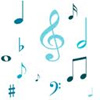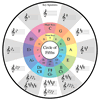Music Theory for Beginners
Key ConceptsMusic Theory is the study of all the components and concepts that make up the language of music. Just as nouns, verbs, adverbs, adjectives, etc., are some of the elements that create the spoken word - notes, tones, semitones, clefs, staves, rests, intervals, accidentals, time signatures, key signatures, etc., are some of the elements used in creating music.
We look at these elements and show you how they all come together. This enables musicians to not only play and write music, but also understand its structure and analyze what they hear.
Topics for discussion:We have several different categories for you to look at, with links to comprehensive pages on each topic. If you are a beginner - basic theory would be the best place to start. Educational videos have been included wherever possible - they are informative and very helpful in understanding basic concepts.
- Basic Theory: An introduction to the core building blocks of music.
- Tones & Semitones: Understanding whole steps and half steps—the foundation of scales.
- Time Signature: How beats are grouped and counted in written music.
- Key Signature: Sharps and flats that show the key of a piece at a glance.
- Music Intervals: The distance between notes and how intervals shape melody and harmony.
- Circle Of Fifths: A visual guide to key relationships, sharps, flats, and chord movement.
- Music Terminology: Clear explanations of essential terms used throughout music theory.
- Bass Clef: How to read notes written for lower‑pitched instruments and voices.
- C Clef: Understanding alto and tenor clefs and where middle C sits on each.
- Repeat Signs: Symbols that tell you when to repeat sections of music.
- Musical Terms: A glossary of common words and expressions used in music notation.
Basic Theory

A great starting point for beginners. Explore the fundamentals of music theory, and the concepts you will need to to understand. They include:
- pitch, sound, notes, staves and clefs
- bar lines ... repeat signs and related symbols including endings, codas and segnos.
- notes in detail - shape, length, different types of notes
- notes and rests
- rules regarding the stems of notes
- video - note names, rests, dotted notes... learn more
Tones and Semitones

The building blocks of music, the difference between tones and semitones and a list of examples.
- what are tones?
- what are semitones?
- the difference between tones and semitones
- diatonic and chromatic semitones
- accidentals and how they affect tones and semitones
- video - accidentals, tones, semitones... learn more
Time Signature

Different types of time signatures and where they are used along with a few examples for good measure.
- what is a time signature?
- where is it placed?
- what are the more common time signatures?
- simple and compound time signatures?
- where simple time signatures are used?
- where compound time signatures are used?... learn more
Key Signature

The importance of key signatures, including videos by MrTheoryGuy which you will find extremely helpful:
- what is a key signature?
- where is it placed?
- the order of sharps and flats in a key signature?
- where accidentals are placed on The Stave?
- key signature chart of all major and minor keys
- videos - the basics: parts 1, 2, & 3... learn more
Music Intervals

- what is an interval?
- diatonic and chromatic intervals?
- names which define each interval... major minor, augmented, diminished and perfect
- harmonic and melodic intervals?
- perfect and imperfect intervals?
- dissonant and compound intervals?
- interval inversions?
- tritones?
- common names for music intervals... learn more
Circle Of Fifths

The circle of fifths is a fundamental concept in music theory, and it's a great resource for any musician or music enthusiast looking to expand their understanding of key relationships and chord progressions. We can determine:
- key signatures including graphic representations of each one
- all major and relative minor keys.
- sharps and flats and how they relate to each key
- chord progressions
- the order of keys
- clockwise movement of perfect fifths... learn more
Music Terminology

A closer look at specific musical terms and concepts you will find useful.
- clef transposition?
- key transposition?
- legato and staccato?
- the slur?
- the tie?
- enharmonic change?
- modulation?
- syncopation?
- tetrachords... learn more
Bass Clef

Definition of a Bass clef and the notes on the bass clef - notes on lines and notes in spaces - diagrams, video... also known as the F Clef.
C Clef

A variety of C Clefs that position the middle 'C' on different lines, defining specific pitch ranges for instruments and voices. Most commonly used are the Alto and Tenor Clefs.
Repeat Signs

The most commonly used repeat signs and symbols used in sheet music. These include first and second endings, capos and codas... Dal Capo, Dal Segno, Al Coda. We include diagrams and examples using these signs which help to simplify and de-clutter music manuscript.
Glossary of Musical Terms

A glossary of very useful musical terms from A - Z. We even managed to find some terminology for X, Y and Z! 😲
Often you will come across certain words or symbols used in sheet music, musical scores, or many educational music sites. They may be terms you have never seen before or may not understand, as many of them derive from other languages such as Latin or Italian... learn more
